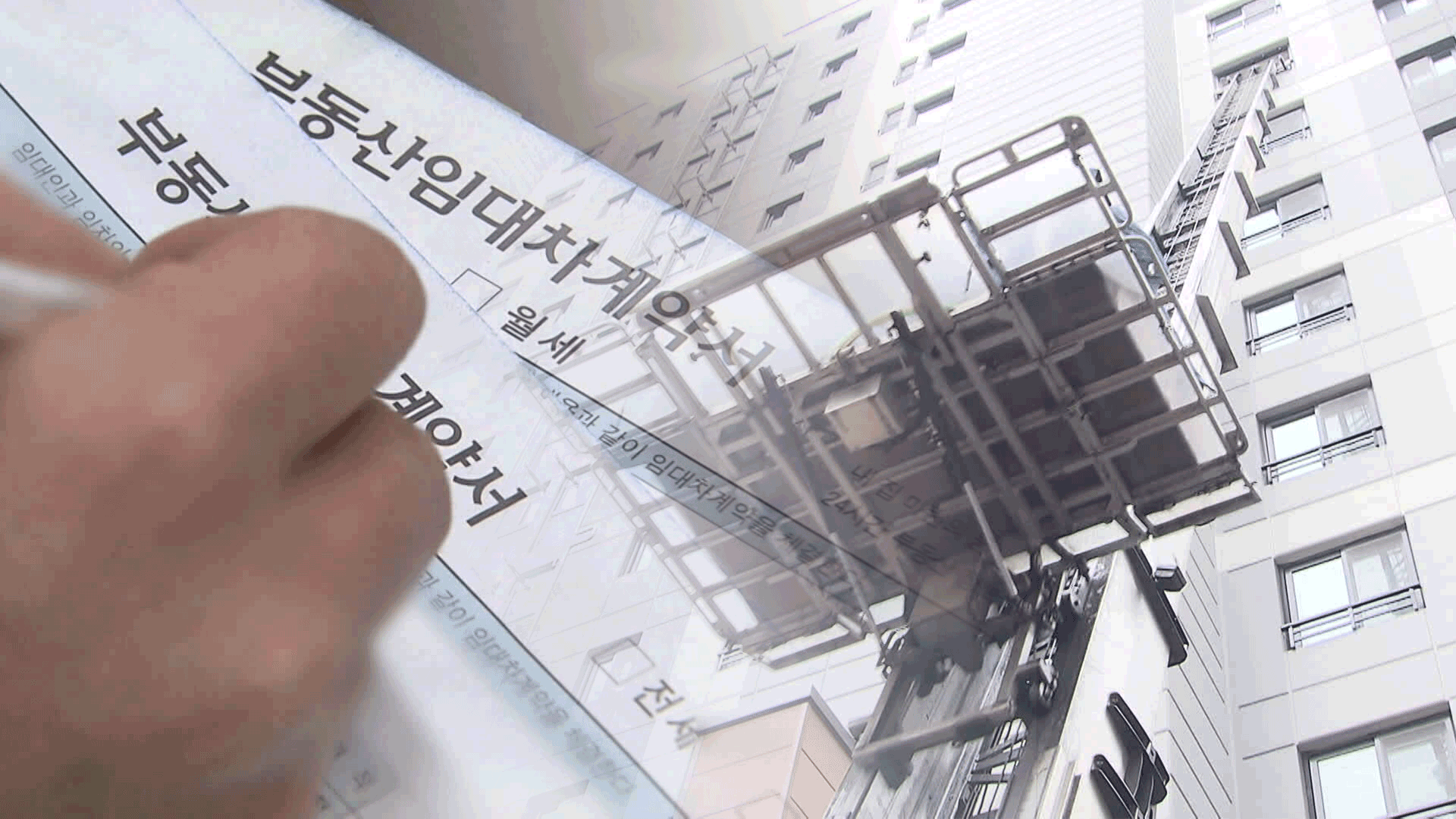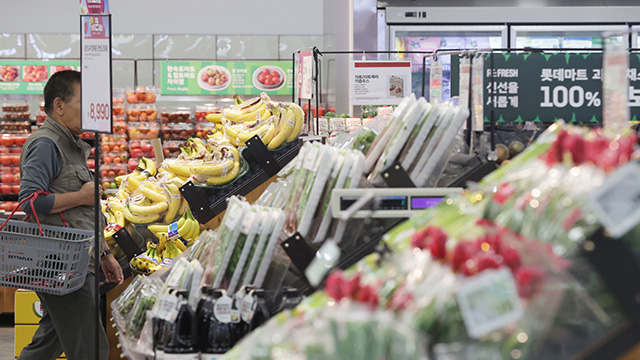[Anchor]
Due to the government’s tightened lending rules, buyers of newly built apartments who planned to use jeonse deposits to pay their final balance are now facing a crisis.
That's because it's difficult to find tenants who can move in without relying on jeonse loans.
For now, the Seoul apartment market is holding its breath.
Reporter Lee Ji-eun explains how long this trend might last.
[Report]
This newly built apartment complex with 1,800 units began move-ins late last month.
Owners who plan to live in the units themselves are not subject to the tightened loan regulations. But those planning to rent out their units on jeonse (lump-sum lease) terms are growing anxious.
That’s because jeonse loans conditioned on a transfer of ownership are now blocked.
[Kang Sung-bae / Real Estate Agent, Dongdaemun-gu, Seoul: "Those who haven’t rented out their units are panicking, frankly. They don’t have enough funds, so they can’t even switch to monthly rent."]
At another apartment complex nearing completion with about four months until move-in, the situation is even more urgent.
Most jeonse contracts haven’t been signed, and landlords are finding it difficult to locate tenants who can move in without taking out a loan.
[Kim / Real Estate Agent, Dongdaemun-gu, Seoul: "Eight out of ten tenants take out a jeonse loan. Honestly, the jeonse price for an 84㎡ unit is about 700 million won. Who has that kind of cash? If they did, they’d have bought their own home already."]
After a recent surge, the overheated Seoul real estate market has temporarily cooled.
The ban on gap investment, combined with the introduction of Phase 3 Stress Debt Service Ratio (DSR) starting today (7.1), has further tightened borrowing limits.
[Oh Seok-jong / Real Estate Agent, Seongdong-gu, Seoul: "Buyers now have to reassess whether they actually have the financial means, which obviously affects contract activity."]
However, analysts say the impact of this “credit tightening” may only last about six months at most.
In fact, the 2019 ban on mortgage loans for apartments priced over 1.5 billion won only lasted six months before triggering a “balloon effect."
[Kim Eun-sun / Head of Big Data Lab, Zigbang: "Because the government is currently focused on curbing demand through financial restrictions, there needs to be a complementary response to uncertainties on the supply side, like the decline in new housing supply and delays in redevelopment projects."]
Experts stress that follow-up measures—especially housing supply plans—must be rolled out swiftly to stabilize the market.
KBS News, Lee Ji-eun.
Due to the government’s tightened lending rules, buyers of newly built apartments who planned to use jeonse deposits to pay their final balance are now facing a crisis.
That's because it's difficult to find tenants who can move in without relying on jeonse loans.
For now, the Seoul apartment market is holding its breath.
Reporter Lee Ji-eun explains how long this trend might last.
[Report]
This newly built apartment complex with 1,800 units began move-ins late last month.
Owners who plan to live in the units themselves are not subject to the tightened loan regulations. But those planning to rent out their units on jeonse (lump-sum lease) terms are growing anxious.
That’s because jeonse loans conditioned on a transfer of ownership are now blocked.
[Kang Sung-bae / Real Estate Agent, Dongdaemun-gu, Seoul: "Those who haven’t rented out their units are panicking, frankly. They don’t have enough funds, so they can’t even switch to monthly rent."]
At another apartment complex nearing completion with about four months until move-in, the situation is even more urgent.
Most jeonse contracts haven’t been signed, and landlords are finding it difficult to locate tenants who can move in without taking out a loan.
[Kim / Real Estate Agent, Dongdaemun-gu, Seoul: "Eight out of ten tenants take out a jeonse loan. Honestly, the jeonse price for an 84㎡ unit is about 700 million won. Who has that kind of cash? If they did, they’d have bought their own home already."]
After a recent surge, the overheated Seoul real estate market has temporarily cooled.
The ban on gap investment, combined with the introduction of Phase 3 Stress Debt Service Ratio (DSR) starting today (7.1), has further tightened borrowing limits.
[Oh Seok-jong / Real Estate Agent, Seongdong-gu, Seoul: "Buyers now have to reassess whether they actually have the financial means, which obviously affects contract activity."]
However, analysts say the impact of this “credit tightening” may only last about six months at most.
In fact, the 2019 ban on mortgage loans for apartments priced over 1.5 billion won only lasted six months before triggering a “balloon effect."
[Kim Eun-sun / Head of Big Data Lab, Zigbang: "Because the government is currently focused on curbing demand through financial restrictions, there needs to be a complementary response to uncertainties on the supply side, like the decline in new housing supply and delays in redevelopment projects."]
Experts stress that follow-up measures—especially housing supply plans—must be rolled out swiftly to stabilize the market.
KBS News, Lee Ji-eun.
■ 제보하기
▷ 카카오톡 : 'KBS제보' 검색, 채널 추가
▷ 전화 : 02-781-1234, 4444
▷ 이메일 : kbs1234@kbs.co.kr
▷ 유튜브, 네이버, 카카오에서도 KBS뉴스를 구독해주세요!
- Jeonse loan rules
-
- 입력 2025-07-02 00:31:00

[Anchor]
Due to the government’s tightened lending rules, buyers of newly built apartments who planned to use jeonse deposits to pay their final balance are now facing a crisis.
That's because it's difficult to find tenants who can move in without relying on jeonse loans.
For now, the Seoul apartment market is holding its breath.
Reporter Lee Ji-eun explains how long this trend might last.
[Report]
This newly built apartment complex with 1,800 units began move-ins late last month.
Owners who plan to live in the units themselves are not subject to the tightened loan regulations. But those planning to rent out their units on jeonse (lump-sum lease) terms are growing anxious.
That’s because jeonse loans conditioned on a transfer of ownership are now blocked.
[Kang Sung-bae / Real Estate Agent, Dongdaemun-gu, Seoul: "Those who haven’t rented out their units are panicking, frankly. They don’t have enough funds, so they can’t even switch to monthly rent."]
At another apartment complex nearing completion with about four months until move-in, the situation is even more urgent.
Most jeonse contracts haven’t been signed, and landlords are finding it difficult to locate tenants who can move in without taking out a loan.
[Kim / Real Estate Agent, Dongdaemun-gu, Seoul: "Eight out of ten tenants take out a jeonse loan. Honestly, the jeonse price for an 84㎡ unit is about 700 million won. Who has that kind of cash? If they did, they’d have bought their own home already."]
After a recent surge, the overheated Seoul real estate market has temporarily cooled.
The ban on gap investment, combined with the introduction of Phase 3 Stress Debt Service Ratio (DSR) starting today (7.1), has further tightened borrowing limits.
[Oh Seok-jong / Real Estate Agent, Seongdong-gu, Seoul: "Buyers now have to reassess whether they actually have the financial means, which obviously affects contract activity."]
However, analysts say the impact of this “credit tightening” may only last about six months at most.
In fact, the 2019 ban on mortgage loans for apartments priced over 1.5 billion won only lasted six months before triggering a “balloon effect."
[Kim Eun-sun / Head of Big Data Lab, Zigbang: "Because the government is currently focused on curbing demand through financial restrictions, there needs to be a complementary response to uncertainties on the supply side, like the decline in new housing supply and delays in redevelopment projects."]
Experts stress that follow-up measures—especially housing supply plans—must be rolled out swiftly to stabilize the market.
KBS News, Lee Ji-eun.
Due to the government’s tightened lending rules, buyers of newly built apartments who planned to use jeonse deposits to pay their final balance are now facing a crisis.
That's because it's difficult to find tenants who can move in without relying on jeonse loans.
For now, the Seoul apartment market is holding its breath.
Reporter Lee Ji-eun explains how long this trend might last.
[Report]
This newly built apartment complex with 1,800 units began move-ins late last month.
Owners who plan to live in the units themselves are not subject to the tightened loan regulations. But those planning to rent out their units on jeonse (lump-sum lease) terms are growing anxious.
That’s because jeonse loans conditioned on a transfer of ownership are now blocked.
[Kang Sung-bae / Real Estate Agent, Dongdaemun-gu, Seoul: "Those who haven’t rented out their units are panicking, frankly. They don’t have enough funds, so they can’t even switch to monthly rent."]
At another apartment complex nearing completion with about four months until move-in, the situation is even more urgent.
Most jeonse contracts haven’t been signed, and landlords are finding it difficult to locate tenants who can move in without taking out a loan.
[Kim / Real Estate Agent, Dongdaemun-gu, Seoul: "Eight out of ten tenants take out a jeonse loan. Honestly, the jeonse price for an 84㎡ unit is about 700 million won. Who has that kind of cash? If they did, they’d have bought their own home already."]
After a recent surge, the overheated Seoul real estate market has temporarily cooled.
The ban on gap investment, combined with the introduction of Phase 3 Stress Debt Service Ratio (DSR) starting today (7.1), has further tightened borrowing limits.
[Oh Seok-jong / Real Estate Agent, Seongdong-gu, Seoul: "Buyers now have to reassess whether they actually have the financial means, which obviously affects contract activity."]
However, analysts say the impact of this “credit tightening” may only last about six months at most.
In fact, the 2019 ban on mortgage loans for apartments priced over 1.5 billion won only lasted six months before triggering a “balloon effect."
[Kim Eun-sun / Head of Big Data Lab, Zigbang: "Because the government is currently focused on curbing demand through financial restrictions, there needs to be a complementary response to uncertainties on the supply side, like the decline in new housing supply and delays in redevelopment projects."]
Experts stress that follow-up measures—especially housing supply plans—must be rolled out swiftly to stabilize the market.
KBS News, Lee Ji-eun.
-
-

이지은 기자 written@kbs.co.kr
이지은 기자의 기사 모음
-
이 기사가 좋으셨다면
-
좋아요
0
-
응원해요
0
-
후속 원해요
0










![[속보] 심우정 검찰총장 “형사사법시스템, 국가 <br>백년대계로 설계 돼야”](/data/layer/904/2025/07/20250702_r3BkPK.jpg)




이 기사에 대한 의견을 남겨주세요.